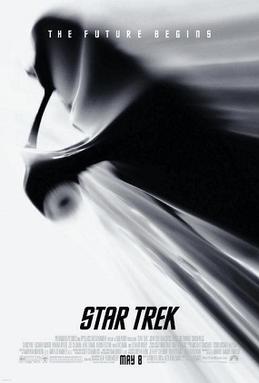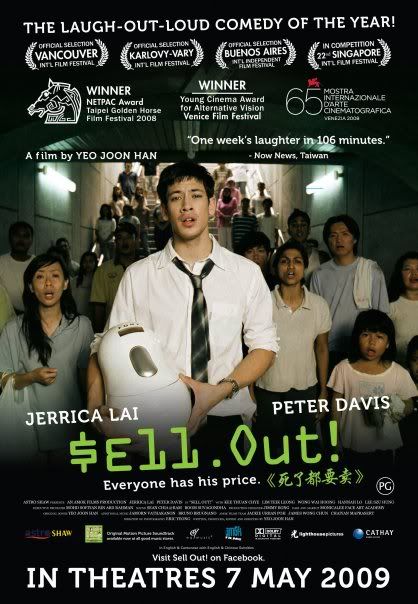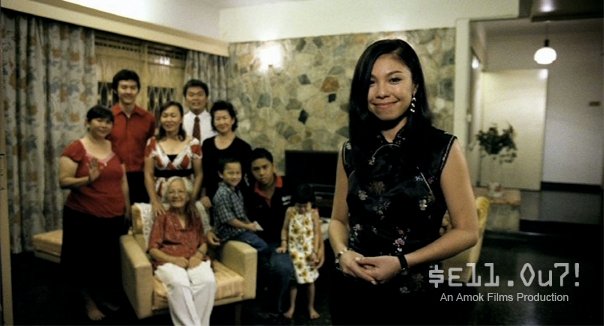This is bittersweet. Since I am no longer living in US, I no longer can watch films on the same day they are released in the US and therefore making me unable to react to most of the annual Best-of lists written by the critic. I usually do this lists closer to the Oscar ceremony rather than in end of December since I can't watch all the movies unless I live in LA/NY. But this may be the last list whose entries I watched in US. I watched 44 new films released last year and looking at the list, I should have watched many more knowing that it would be my last year living there.
These are my list of thoughts on last year's films. I'd keep it simple this time, starting with the bad going to good.
BAD:Worst Excuse For a Film:Sex and The City: The Movie - This film has no story whatsoever. In other movies, some of the "major" plot points would be resolved in a few minutes but in this movie, they drag on for the whole 2 hours. It's a shame because the original series was actually a good show. But this film is just an excuse to get this 4 women back together again and do their stuffs as well as showing some product placements for its target audience.
Mamma Mia! - This goes back to the original musical which itself was an excuse to have ABBA songs staged. Except the original musical doesn't have Pierce Brosnan terrible voice.
Most Overrated:The Curious Case of Benjamin Button - The Curious Case of Benjamin Button peaked emotionally halfway throughout the film. After that, the film goes downhill. It's not a bad film but the central romance which anchors the 2nd half of the film is unconvincing and that proves to be the film's undoing. Also, the film seems to show that lessons from life aging backwards are more or less the same with normal life aging forwards, which makes the whole idea that drives the movie somewhat pointless. Lastly, Brad Pitt is really flat here, especially towards the end of the film. Given the # of oscar nominations this film has including Brad Pitt as best actor, this film is the most overrated film of the year.
Biggest Disappointment:Quantum of Solace - Casino Royale was a great success because it treated James Bond seriously and make him more human. Ironically, Quantum of Solace fails because it tried to replicate Casino Royale without adding anything fresh to it.
Pineapple Express - 2007 was Judd Apatow's year with the success of Knocked Up and Superbad. But 2008 proved to be a dud with the failure of Drillbit Taylor and this film, which fails to mix humor and action effectively. Plus, Seth Rogen starts to show quickly within 1 year how little range he has. He better improve fast or else lose his career.
The X Files: I Want To Believe - It's fine if Chris Carter wants to just do a supernatural story rather than continuing the mythology for the 2nd film. But when the reunion of Mulder and Scully has been long awaited for years and all you've got is just a lame supernatural story that sounds like a bad episode, you're wasting all the goodwill that have built up for this moment.
Indiana Jones and The Kingdom of The Crystal Skull - one weakness of the Indiana Jones films are that they never set any rules for the supernatural happenings in their universe; anything can happen. When the aliens show up in the end, you just can't help but shake your head. But the worst part of the film is that the feeling that Lucas and Spielberg makes this because so many fans ask for it, not because they have anything new and exciting to show.
Be Kind Rewind - Michel Gondry is a talented visionary director, but he's a poor writer. His story has poor structure and the dialogues have bad timings. He needs to work with good writers like Charlie Kauffman so that we can see more Eternal Sunshine than another interesting failure like this.
Worst Film:21 - turns a fascinating true story into a boring cliched film complete with the main character narrating everything. But perhaps the worst part of the film is that there's no way the characters in the film can get into MIT in the first place given how stupid they can be.
10000 BC - An epic movie that's part boring and part the funniest unintentional comedy of the year.
Hancock - A film that doesn't know what it wants to be - a superhero dark comedy or a tragedy - that results in a tonal mess. Part of it is because the film feels like it has been edited by the studio not director Peter Berg. Lastly, like Hitch, Will Smith has again shown how afraid he is to tackle the subject of mixed-race romance head on in exchange for making the film more commercial.
The Happening - I commented on the first draft of the screenplay that M Night needs to make improvement on the romance aspect of the script. He did improve on that but he also chickened out and removed some of the best things that made the story scary. Plus the acting from Mark Wahlberg, Zooey Deschanel, and John Leguizamo is surprisingly terrible. The worst part is, this time around, even M Night's directing has let him down.
Eagle Eye - A preposterous, ridiculous high tech thriller that thinks it's smart when it's actually so implausible and absurd.
... and the worst film of the year is ...
Righteous Kill - how can a film with De Niro, Pacino and written by the writer of Inside Man be so bad? We should have suspected given that no big studio wants to distribute this and it's produced by Millenium Films and directed by Jon Avnet who also made the Pacino stinker 88 Minutes. But still, I expected some decent film at least. What I've got here instead is a sleazily made cop film with dialogue and acting worse than any cop show on TV. Some of the dialogue and acting by Pacino and De Niro are very embarassing and I sure hope that they paid well for this gig. But the most embarassing thing in this film is that the best performance in this film that has Pacino, De Niro, John Leguizamo and Carla Gugino is perhaps given by 50 Cent.
and now, THE GOOD
Most Overlooked Villain:Prince Nuada in Hellboy II (played by Luke Goss) - it's rare that we see a good villain in superhero films. Luke Goss' Prince Nuada is a great villain with a great commanding presence and a great martial arts ability. It's too bad that he's overshadowed by The Joker in The Dark Knight. While The Joker is an exceptional villain in an exceptional film, we need to see more Prince Nuada in other films that can gamely oppose the heroes. Nuada puts the villain in the first Hellboy, Rasputin, to shame.
Most Overlooked Performance:Aaron Eckhart (as Harvey Dent in The Dark Knight) - another actor overshadowed by Heath Ledger's performance as the joker, Aaron Eckhart's Harvey Dent has perhaps the biggest character arc in the film, more so than the batman and the joker and given the importance of the character - he's what batman and joker are fighting for. his performance shouldn't be ignored.
Adam Sandler (as Zohan in You Don't Mess With The Zohan) - puts on a fake accent and attempts a Ben Stiller-like fake persona in Zohan, an Israeli super commando who secretly wanst to be a hairdresser, resulting in perhaps his funniest comedic role since The Wedding Singer
James Franco (as Saul in Pineapple Express) - This is perhaps the most criminally overlooked performance of the year. James Franco, previously known as a serious and moody actor who unfortunately always appear in more bad movies than good, gives a career changing performance as a stoned weed dealer in Pineapple Express which is surprisingly very effective. He's perhaps the best thing that happened in the film. Had this been shown in any year except 2008, perhaps James would have perhaps gotten a best actor nomination for this role.
Most Underrated:Speed Racer - I'll admit that Speed Racer isn't a great film and for a family film, the plot could be simplified. However, the criticial drubbing and the failure of this film was highly unfair. The Wachowski Brothers managed to successfully bring the anime eye candy to live action but they don't forget the heart in the family story either. I'm happy to see that it has already become a cult film with some fans (including Richard Corliss in Time Magazine who names it in his top 10 films in 2008). I hope that time will give this film a chance to be recognized.
Sex Drive - In a year where Judd Apatow sex comedies flopped, suddenly a great teen sex comedy film that wasn't made/produced by Apatow came out of nowhere and was missed by everyone. Sex Drive has many characteristics of good Apatow movies - funny sex jokes, romantic storyline that actually has real heart - but it doesn't feel like an Apatow film (none of the apatow regulars show up, for one). Plus, this films is perhaps the first film to integrate the recent web activities like chatting, blogging and youtube successfully into the film. The film deserves to be found by more audience.
Best Pics:The Dark Knight - An almost perfect film in every way. Nothing more needs to be said about this film. The Academy snub for Best Picture and Director will haunt them forever.
Slumdog Millionaire - It's a great year when of the 2 best pictures of the year, one is very dark, somber affair and the other one is an inspiring, underdog fairy tale. Make no mistake, Slumdog Millionaire is not one of those false, schmaltzy Hollywood fairy tale, but a truly wonderful one that gives fairy tale a good name. All thanks to director Danny Boyle who kept things authentic as much as possible by shooting in India and writer Simon Beaufoy who adapted the plot brilliantly from a book by Vikas Swarup. This is the film that will win the oscar this year.
Cloverfield - It's a divisive movie because of the overhype and because when it showed up, the Blair Witch handheld style pissed off many in audience (and sent some vomiting). But when the hype settled, Cloverfield is a successful experiment. The handheld style was utilized effectively to generate tension and despite the "real time" nature of the handheld film the filmmakers still managed to tell the whole story in a typical story arc of a hollywood film. Lastly, kudos for the filmmakers for having the guts to put the ending there. This film has successfully deconstructed and revolutionized the monster movie genre at the same time.
Doubt
Milk
Traitor
Definitely, Maybe
The Incredible Hulk
Wall-E
Best Film To Talk About:Doubt
Most Pleasant Surprises:Definitely, Maybe - Best surprise of the year. It's a film that starts like any other romantic comedy but morphs into an insightful film that examines about the choices that we did and did not make in life and how much we regret them later in life. The film defies many romcom cliches and keep the audience guessing. The casting of the girl who have a great chemistry with Ryan Reynolds that it's obvious she's "the one" but that only serves to better the film
Rambo - when Sylvester Stallone made Rocky Balboa, people laughed and were surprised it was good. When Sly announced he was making another Rambo, people naturally laughed harder. Unlike Rocky, the character Rambo has become a joke over the years. That's why everyone who laughed would find themselves even more surprised by how good the final product was. The fourth Rambo film is a straight old school action films with guns and violence and a lot of excitement. But most importantly, Sylvester Stallone has done the impossible - bringing back respectability to the classic character.
Valkyrie - It stars Tom Cruise. The ending is already known even before the movie was made. Yet, Bryan Singer still managed to make a tense and ultimately sad tale of people who sacrificed their life to do the right thing.
You Don't Mess With The Zohan - Adam Sandler ditched his typical childish humour and went for something that Ben Stiller would do: create a fake persona and lampoon it by living and breathing it. When Sandler puts on a fake accent and bad hair to play a macho israel commando who secretly wants to be a hairdresser, the result is comedy gold.





















